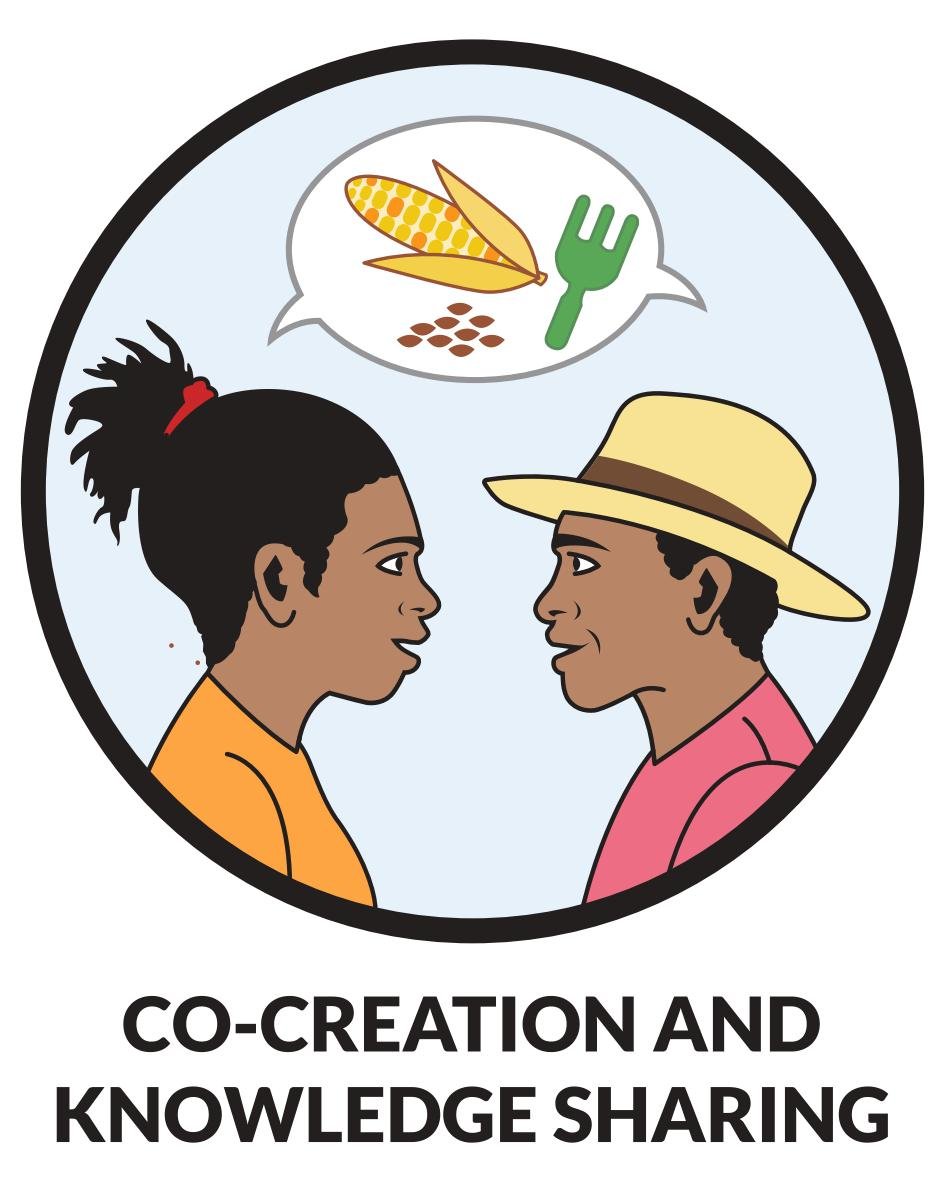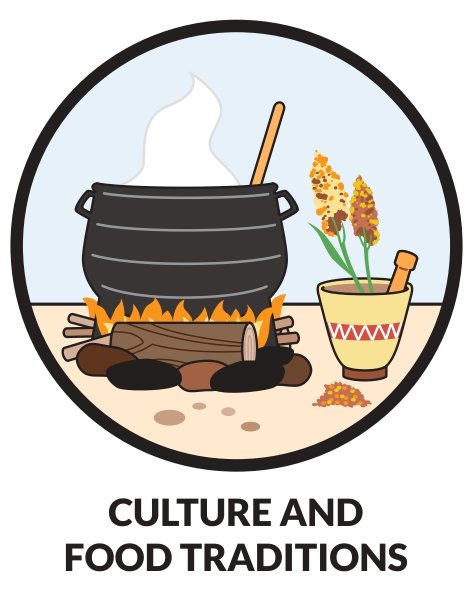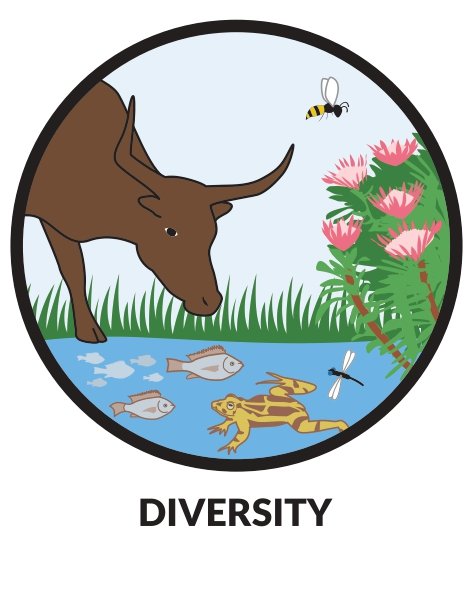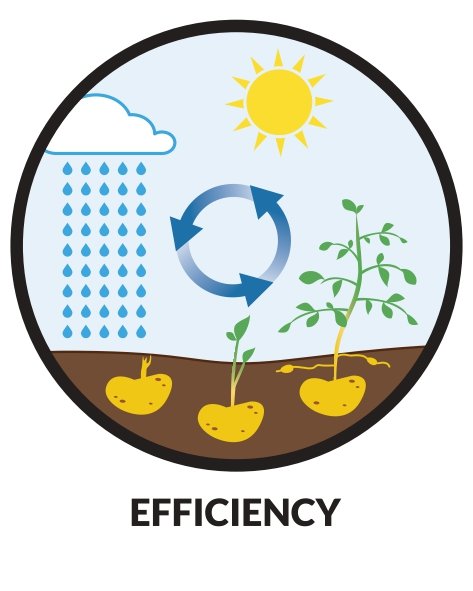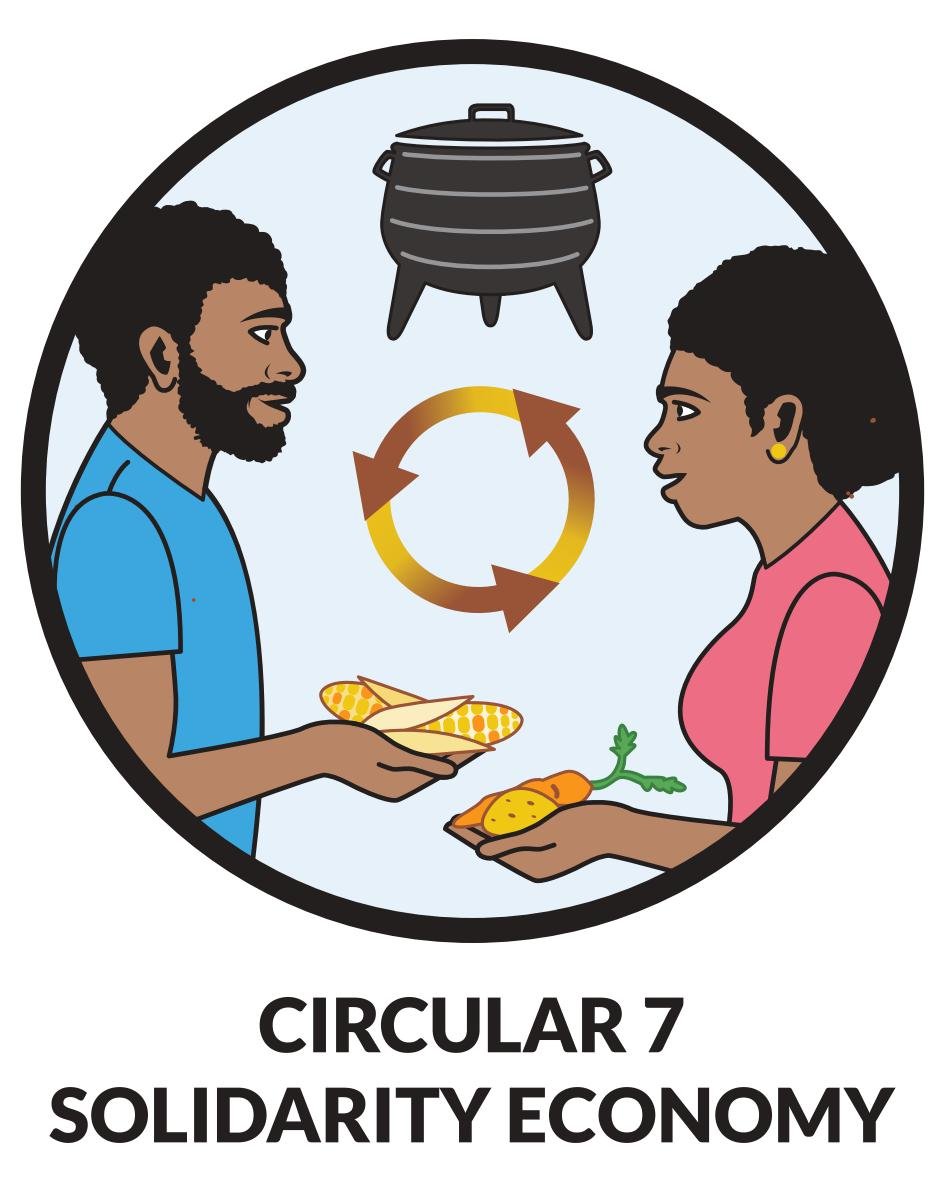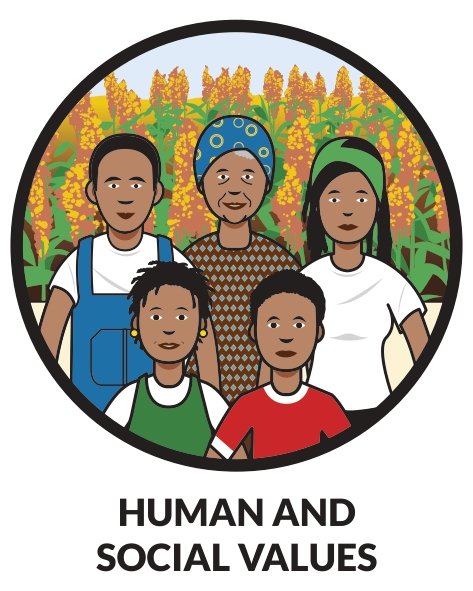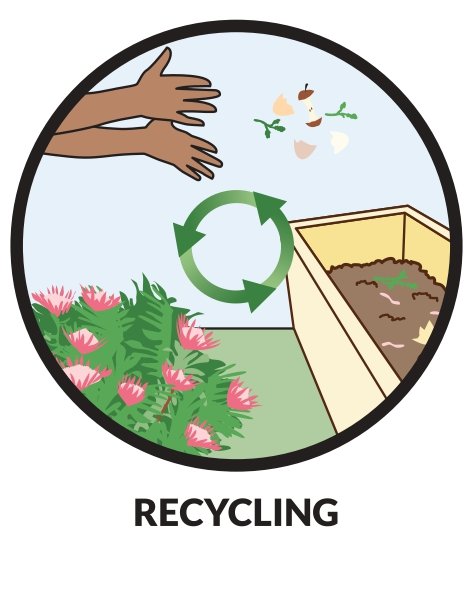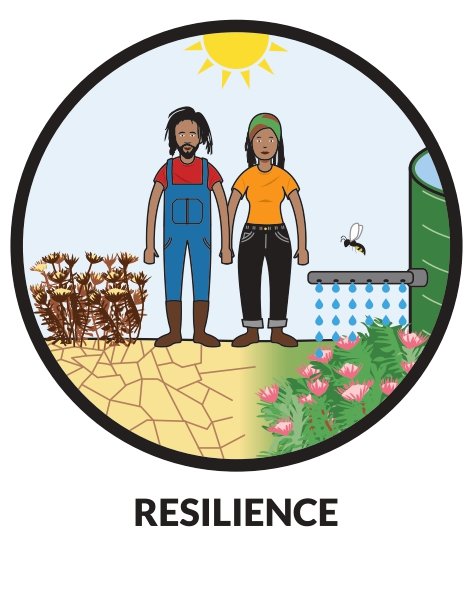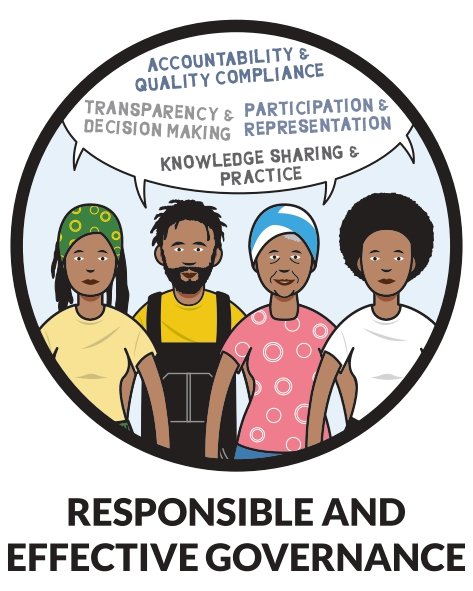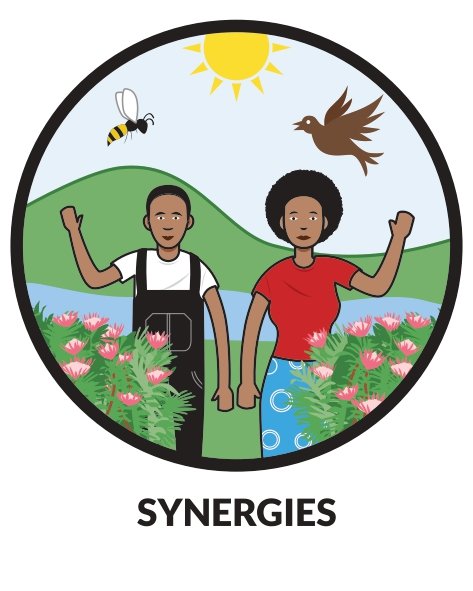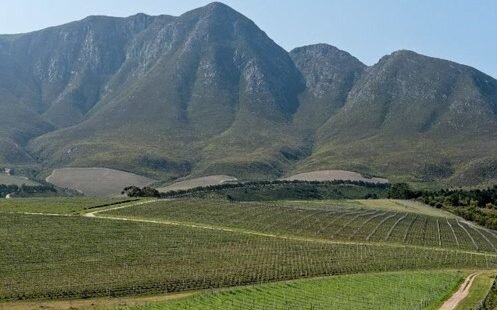AGROECOLOGY
Agroecology is emerging as the agricultural model and food system to activate social change for an equitable and sustainable future. EMG’s agroecology approach encompasses the ecological, economic, social and political dimensions of food systems change – informed by Agroecology SA (AE SA) Principles: (our selection and edit):
• Opposes the corporate model of agriculture … aims to bring about food sovereignty.
• Emphasises the building of agency of food producers and eaters… extends beyond primary producers to processors, distributors, marketing, retail and consumers.
• Extends beyond the food system to call for transformation of economic and social structures… is a people-led movement.
• Focuses on safeguarding and enhancing the rights of women, youth and indigenous peoples.
• Must be supported, rather than led, by science and policy.
• Emphasises environmental sustainability - mimicking ecological processes, …no or few external inputs, …does not prescribe production practices.
• AE SA encourages the adoption of participatory guarantee systems (PGS) to provide quality assurances… excludes the use of genetically modified organisms.
• Can be practiced in both small and large-scale agricultural systems.
ELEMENTS OF AGROECOLOGY
LOCAL: PROVINCIAL CONTEXT
In the Western Cape farmers produce from communities in areas within the Kuils River Catchment Area, on the periphery of Cape Town. Constrained by apartheid infrastructure and spatial planning, urban farming is a livelihood strategy, ensuring access to nutritious food. Here our agroecology work threads together the health and quality of Kuils River’s water, its impact on food-growing activities and communities - underpinned by a call for land and agrarian reform, water management and socio-economic justice.
In Mpumalanga and the Eastern Cape EMG work focuses strongly on food sovereignty, indigenous knowledge systems, and establishing farmer owned seed-systems. Addressing the gendered dimension of agroecology, our work has an important focus on women farmers’ access to, and ownership of land, currently mostly held under customary tenure arrangements, impacting on women farmers’ subsistence livelihoods and food security.
GLOBAL: AVACLIM in Burkina Faso, Senegal, Morocco, Ethiopia, South Africa, Brazil and India
▶️FACT SHEET 2020: Phakamani SiyephamBILI, KWAZULU NATAL
The mission of the Phakamani Siyephambili "Rise and Go" organisation is to advance agroecology and food sovereignty by enabling producers to use their local knowledge of isiXhosa culture to source organic products rich in nutrients for local markets.
▶️FACT SHEET 2020: Heiveld CooperativE, NORTHERN CAPE 2020
The mission of the Heiveld cooperative is to produce and market organic rooibos tea at fair prices and thus creating sustainable livelihoods
▶️FACT SHEET 2020: Cold Mountain coOPERATIVE, WESTERN CAPE
The Cold Mountain Cooperative aims to demonstrate sustainable development through indigenous knowledge and agroecology to achieve a holistic and self-sustaining agricultural ecosystem.
▶️FACT SHEET 2020: GOEDVERWACHT - ECOWIN, WESTERN CAPE
EcoWin is a community driven initiative to empower the residents of Goedverwacht to produce unique products in an eco friendly way. EcoWin works closely with the Goedverwacht Tourism Development Forum to advance the development of the community and promote it as an agritourism destination.
▶️FACT SHEET 2020: Bryanston market & pgs (now egoli pgs)
Bryanston Market's mission is to create a reliable and transparent organic guarantee system for farmers and consumers to enable farmers to participate in the benefits of PGS and promote organic farming.
▶️FACT SHEET 2020: BIOWATCH
The mission of Biowatch is to challenge the industrialised food system and demonstrate agroecology as a
means of ensuring biodiversity while attaining food and seed sovereignty and social justice.
SOUTH AFRICA - NATIONAL WORKSHOP: AGROECOLOGY PRODUCERS / november 2020
Practitioners, farmers and scientists are studying agroecological initiatives in seven countries: to promote agroecology to the political authorities of these countries and to intergovernmental bodies.
NATIONAL ADVOCACY WORKSHOP “Sustaining our land, sustaining our society”
Exploring the contribution of agroecology to sustainable land use for sustainable livelihoods and to achieve Land Degradation Neutrality (LDN) targets in support of collective efforts to respond to the climate and food security crises.
AGROECOLOGY PRODUCERS - KNOWLEDGE EXCHANGE WORKSHOP: SOCIAL INNOVATIONS & TECHNOLOGIES / DECEMBER 2022
LOCAL FOOD NODES: CAPE TOWN, SA
>BUILDING LOCAL FOOD NODES USING TECHNOLOGY:
>WEBINAR: WATCH FARMERS KHULUMA [TALK] WITH ALBIN PONNERT (SWEDEN) AND NOMONDE BUTHELEZI (SA)
> PODCAST: LISTEN HERE
> READ: BLOG “FARMERS RECLAIM THEIR MARKETS – FOOD IS OURS!”
This pilot project in Cape Town aims to understand how an app for small-farmers might assist them to better access markets for their produce. Training and mentoring are being provided to help support farming operations understand how food apps such as Local Food Nodes function and an opportunity to use the app to test it and to see how it might support small-scale farmers.
The Local Food Nodes tool was developed by Swedish farmers to ensure that farmers have better control over the sale of their produce to markets, by giving them full control over pricing and the sale of produce. EMG would like to establish whether this control will also be beneficial to urban food growers in South Africa, where current access to markets often means accepting low prices and produce not being sold.


